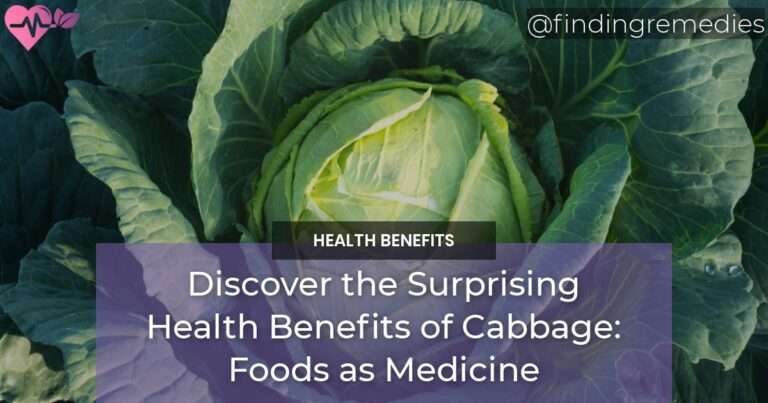Cabbage is often overlooked in the produce aisle, but it is a nutritional powerhouse with numerous health benefits. This cruciferous vegetable is low in calories and packed with vitamins, minerals, and phytonutrients that promote overall health and well-being.
Here are some of the health benefits of cabbage:
Table of Contents
Nutrition Profile of Cabbage
Cabbage is an excellent source of vitamin C, fiber, and other essential nutrients. Here’s a breakdown of its macronutrient and micronutrient content:
- One cup of chopped raw cabbage contains:
- 22 calories
- 2.2 grams of fiber
- 85% of the RDI for vitamin C
- 10% of the RDI for vitamin K
- 6% of the RDI for vitamin B6
- 5% of the RDI for potassium and manganese
Cabbage is also rich in phytochemicals and antioxidants, including sulforaphane, kaempferol, glucosinolates, and anthocyanins. These compounds have been linked to various health benefits.
Natural Compounds in Cabbage
Sulforaphane
Sulforaphane is a sulfur-containing compound that is found in cruciferous vegetables, including cabbage. It has potent anti-inflammatory and anti-cancer properties and has been shown to protect against breast, colon, and prostate cancer.
Glucosinolates
Glucosinolates are sulfur-containing compounds found in cabbage and other cruciferous vegetables. When these compounds are broken down during digestion, they form isothiocyanates, which have been shown to have anti-cancer properties.
Anthocyanins
Anthocyanins are a type of flavonoid that give red cabbage its color. They have been linked to a reduced risk of heart disease and cancer.
Flavonoids
Flavonoids are a group of phytochemicals that have anti-inflammatory and antioxidant properties. They are abundant in cabbage and have been linked to various health benefits.
Health Benefits of Cabbage Consumption
Reduced Risk of Cancer (Breast, Colon, Prostate)
Studies have shown that consuming cabbage and other cruciferous vegetables can reduce the risk of several types of cancer, including breast, colon, and prostate cancer. The compounds in cabbage, such as sulforaphane and glucosinolates, have been shown to have anti-cancer properties.
Reduced Risk of Cardiovascular Disease
The high fiber and antioxidant content of cabbage may help reduce the risk of cardiovascular disease. Studies have shown that consuming cruciferous vegetables can help lower cholesterol levels and blood pressure.
Anti-inflammatory and Antioxidant Effects
The phytochemicals in cabbage have potent anti-inflammatory and antioxidant properties. These compounds may help reduce oxidative stress and inflammation in the body, which are underlying factors in many chronic diseases.
Protection Against Diabetes and Related Complications
Cabbage is a low-glycemic-index food, meaning it does not cause a rapid increase in blood sugar levels. Consuming foods with a low glycemic index may help reduce the risk of type 2 diabetes and its complications.
Weight Loss and Management
Cabbage is low in calories and high in fiber, making it an excellent food for weight loss and management. Consuming foods that are high in fiber can help you feel full and satisfied, which may reduce overall calorie intake.
Improved Digestion and Gut Health
The high fiber content of cabbage may help improve digestion and promote gut health. Consuming foods that are high in fiber can help prevent constipation and promote regular bowel movements.
Boosted Immune System
The vitamin C content of cabbage may help boost the immune system and reduce the risk of infections. Vitamin C is essential for the production of white blood cells, which help fight off infections.
Effects of Cooking and Proper Storage
Retention of Nutrients and Natural Compounds
Proper cooking methods and storage of cabbage can help retain its nutrients and natural compounds. Overcooking cabbage can cause it to lose some of its vitamin C content. It’s best to steam or sauté cabbage briefly to retain its nutritional value.
Best Cooking Methods
Steaming or sautéing cabbage is the best way to retain its nutritional value. Boiling cabbage can cause it to lose some of its vitamin C content. Raw cabbage can also be incorporated into salads and other dishes.
Recommendations for Storage
Cabbage can be stored in the refrigerator for up to two weeks. It’s best to store it in a plastic bag or container to prevent moisture loss. Once cut, cabbage should be wrapped in plastic and stored in the refrigerator for up to five days.
Variety and Types of Cabbage
Common Types of Cabbage
There are several types of cabbage, including green cabbage, red cabbage, and savoy cabbage. Each type has a slightly different flavor and nutritional profile.
Nutritional Differences
Red cabbage contains more vitamin C and anthocyanins than green cabbage. Savoy cabbage is a good source of vitamin K and folate.
Culinary Uses
Cabbage can be eaten raw or cooked and can be incorporated into a variety of dishes, including soups, stews, and salads. It can also be fermented to make sauerkraut or kimchi.
Disadvantages and Precautions
Risk of Allergies and Digestive Issues
Some people may be allergic to cabbage or may experience digestive issues after consuming it, such as bloating or gas.
Interference with Thyroid Function
Cabbage contains compounds called goitrogens, which can interfere with thyroid function in large amounts. However, consuming moderate amounts of cabbage is unlikely to cause any problems for most people.
Interaction with Medications
Cabbage contains vitamin K, which can interfere with blood-thinning medications like warfarin. If you are taking any medications, it’s best to talk to your healthcare provider before consuming large amounts of cabbage.
Conclusion
Cabbage is a nutrient-dense vegetable that offers numerous health benefits. It’s rich in vitamins, minerals, and phytochemicals that promote overall health and well-being. Incorporating cabbage into a balanced diet can help reduce the risk of chronic diseases, promote weight loss and management, and improve gut health and digestion.
Resources
- 1. “Cabbage intake and risk of breast, colon, and prostate cancer: a meta-analysis of observational studies” by Guo H, et al.
- 2. “Cabbage consumption and risk of cardiovascular disease: a meta-analysis of cohort studies” by Zhang X, et al.
- 3. “The potential health benefits of cabbage: a review” by Kim H, et al.

